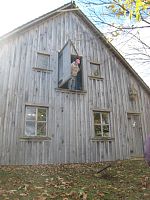 |
| Meg, Dad, and me |
My dad designed and built his barn alone, by hand, in the early 80’s. It seemed to take an eternity, but Dad just kept plugging away, board by board, a master of patience and meticulous craftsmanship—all while commuting three hours a day to his day job at National Geographic. I can’t remember when he finished the barn, just that there it stood all those years, a fixture on the farm, tall and proud, solid as a drum, wood weathering to grey. It was a repository for all things that mattered to Dad: his woodshop and scrillions of tools, each hanging it its place outlined in felt tip magic marker; bicycles; sea kayak; old cars and new; and dozens of signs he’d found, bought, or otherwise procured over the years.
After my dad got sick, the upstairs hay loft—once the ultimate storage bin for Christmas decorations, countless back issues of National Geographic, my grandparents’ china, our model towns we’d made—became the bane of his existence. Talking to him about it by phone, I could practically hear him wringing his hands in despair. The very idea of clutter was a mental weight dragging him down, cannibalizing the energy he needed to fight his cancer. The tumor was the size of a fist; the disease was, in Dad’s words, “game-ending.” But here was something we could do to help. We could clean out his barn.
Dad got a jump on the barnstorming. A couple days before we arrived, somebody came to cart off his 1970 green Volkswagen microbus that he’d decided to donate to his local public radio station. Back in its prime, my sister and I had rattled around that bus on long summer road trips to see our grandparents in Maine. Whoever rode in front with Dad was the co-pilot, and her official duties included pushing the big, fat square radio buttons to unknown, but dramatic, effect. (The radio never worked.) We liked to pretend the bus could fly, and my dad, with his steady hands on the gigantic, puckered steering wheel, was captain of our magical flight.
 |
| the rope 'n chuck method |
The day of the Great Barn Clean Up, we were joined by Dad’s best friend, Philip, and his daughter, as well as my stepmother’s sister and brother-in-law, who were in from England. Philip rented the dumpster and showed up with a box of gloves and face masks; the place was coated in dust and dead stink bugs. We’d imagined flinging everything out of the hay door and right into the dumpster below with reckless abandon, but the dumpster man had refused to park it on grass, so we had to lower the junk on a jerry-rigged rope instead.
Dad climbed up the ladder, wearing two coats and a scarf, settled into a chaise lounge, and watched us paw through boxes. He had the final say: chuck or save. He was efficient, good-humored, and unattached: Most everything we chucked. Here are some of the things we threw away: contents of my Nana’s medicine cabinet (including mouthwash) inexplicably saved after her death in 1997; plastic model town; old scuba regulator and vest; stuffed animals, cracked vinyl suitcases and lawn chairs; warped and waterlogged framed needlepoint rendering of one of my dad’s National Geographic cover photos; a book about the benefits of exercise; Cat Stevens albums; a ceramic chicken with a sombrero.
 |
| ancient scuba vest |
Here are some of the things we couldn’t bear to trash: Dad’s model sailboat, instruction manual for his TRS-80 home computer (Radio Shack, circa 1980), pronghorn antelope trophy shot by my grandfather, tiny wooden wolf in sheep’s clothing; decades of email correspondence. Several boxes of my great-grandparents dishes would be auctioned off at a local fundraiser.
The day was imbued with a peculiar mix of melancholy and relief. It was pretty satisfying to purge the place of junk and stink bugs, especially knowing how much it had been weighing on Dad. But we all knew what it meant: Saying goodbye to Dad’s stuff was merely a precursor to the much harder goodbye to come.
Organizational experts love to tout the mental and emotional benefits of clearing your personal space of unwanted or unused detritus. A few years ago, I got into the habit of trying to throw away or give away five things a week. Even heaving a bent paperclip from the bottom of my junk drawer left me feeling lighter and clearer about what was important, and how I might go about doing it, or creating it.
 |
| Dad with stuffed moose |
This is a wonderfully written post. Sometimes our possessions become burdens. And yet they remind us of our past moments--the time we watched the sunset from that lawn chair, the beautiful beach where we found that smooth rock, the proud day we won that trophy. Purging can lighten us, but it can also be bittersweet.
ReplyDelete